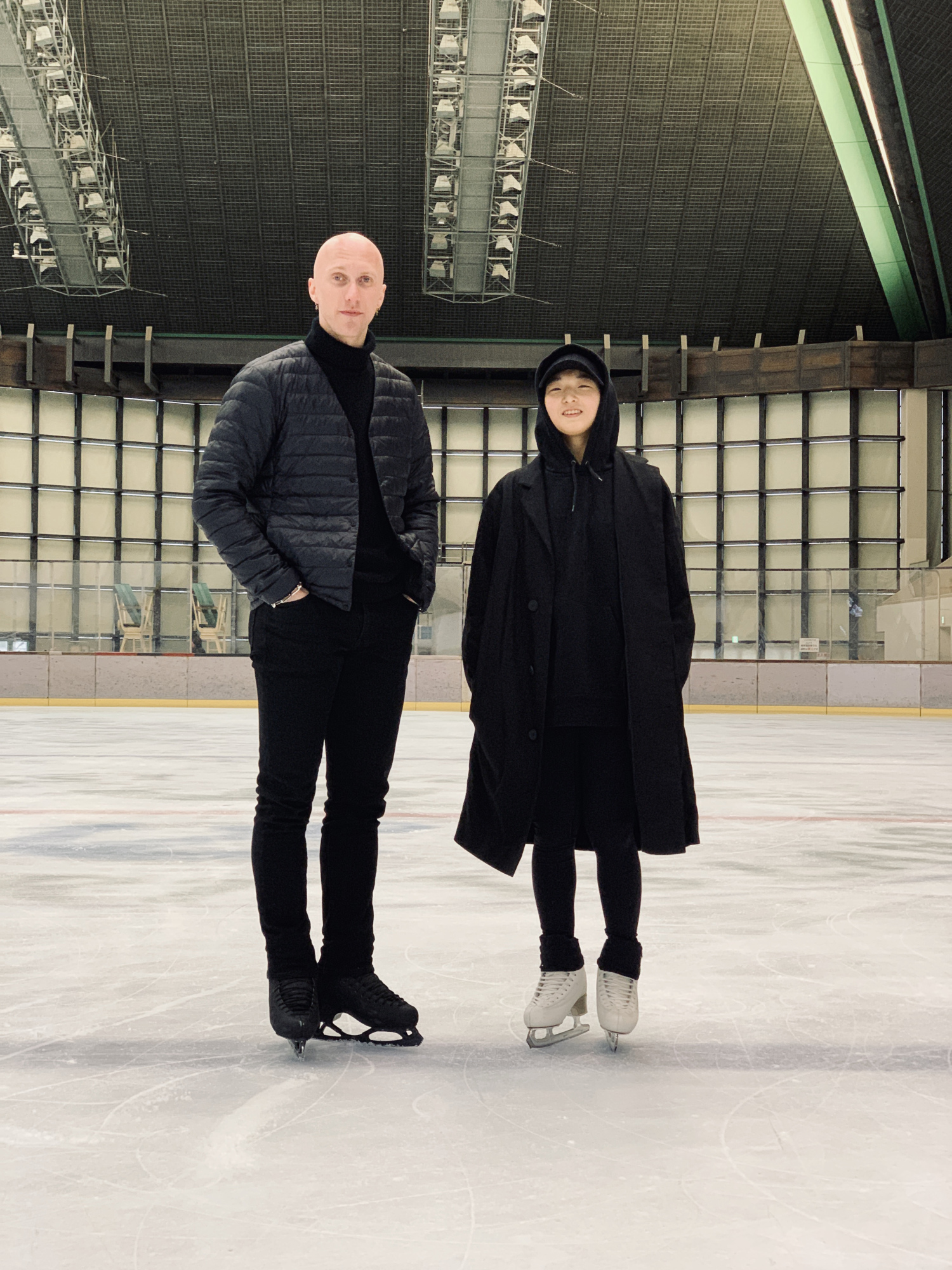Following a disappointing fourth-place finish at last month's Four Continents Championships in California, Japan champion Kaori Sakamoto didn't dwell on her result, but rather went right back to work to prepare for this month's world championships in Saitama.
Benoit Richaud, Sakamoto's choreographer, whose stock is rising as fast as his prized pupil, came to Japan last week and spent four days working with her to refine her free skate to "The Piano."
Following his final session with Sakamoto, the 31-year-old Richaud met with Ice Time for an exclusive interview and discussed the skater's condition heading into the big event.
"Kaori came back on the ice directly from the Four Continents in Los Angeles and she set her goal, which I think is really precise in detail," Benoit stated. "She just wants to skate at her best. She wants to be the best Kaori Sakamoto she can be at the world championships, not thinking about the place or anything.
"It's not something we control," Richaud added. "She is now focusing on herself and she really wants to present the best version of herself in front of her fans and her country."
I asked Richaud what he thought of Sakamoto's performance at the Four Continents.
"I saw the program many times from the Four Continents, but the thing is she was not in a good day," Richaud commented. "But it is hard to judge a performance, because maybe the day after she would do it and it would be perfect."
Richaud, a native of Avignon, France, said he doesn't like to rely on results too much when dealing with his skaters.
"I don't work so much by looking at what people are doing in competition," Richaud remarked. "Sometimes I do, but with Kaori I didn't do it like that. I just came and we fixed what I have to fix. I just felt like this program needs some little changes, nothing spectacular. I think people will not even see it."
Richaud, a former ice dancer, says he chose minor tweaks to help smooth Sakamoto's path.
"We just adjusted a little bit everywhere, some little details," Richaud noted. "We just made some much more comfortable and easier for Kaori to skate.
"I changed little things in the choreo step sequence, and transition also and just perfect the movement," Richaud continued. "We just spent a lot of time to work the musicality, the expression, all the small details that make the component parts go higher."
Sakamoto is in a good frame of mind, Richaud told Ice Time.
"I think she was disappointed in herself at Four Continents," Richaud stated. "In a way, always in a bad situation, there are good things to take. She was disappointed about herself at Four Continents, so right now she really pushes hard and works really, really hard. We were working nine hours a day almost for four days."
Richaud cited Sakamoto's determination and flexibility as being major assets for her.
"Kaori is always going forward and always wants to try new things. I'm a choreographer, not a technical coach, but I said, 'Can we try a double axel/triple toe/triple toe?' and boom, she did it from the first time.
"I said to her, 'Are you able to do 10 double axels?' and it was more like a game from me, and she just did it also the first time."
Richaud feels challenging skaters brings out the best in them.
"I just try to use little things like that, a little experience, and it looks like a game, but it's really not," Richaud said. "It just shows you who she is. She's a fighter. When I ask her something that looks like a game and it's not, she takes it seriously and does it."
Kaori one of a kind
While some in the skating seek fame and fortune, Richaud believes Sakamoto's motivation is more authentic.
"She has the joy of skating. She really likes it. I don't think Kaori is doing it to be famous or be popular or rich," Richaud commented. "You have many skaters from other countries who want to be champions because they want to have a good life. They want to have a job and a good car or they want to have something for their family.
"Kaori is doing it for herself because she likes it. She likes the challenge and to fight against herself. The major thing is she likes to skate."
Ice Time wondered if there was a skater from the past that Richaud would compare Sakamoto to.
"Kaori is really unique. It is really hard to compare her to anyone," Richaud replied. "She really has her own personality and I think that is one of the reasons that people start to like her more and more, because she looks like nobody. She's not a copy of someone. She's herself, she's pure."
Japan a skating paradise
Richaud will return to Japan for the worlds, and said he can't wait.
"I'm looking forward to the worlds because it is my first big competition in Japan, since I started to make choreography," Richaud stated. "I had never come to Japan for a big event, so I'm really excited, because I was already there for a regional competition (Kinki regional championships), it was amazing. It was almost better than going to any world championships. The organization and the crowd, the Japanese fans."
Richaud thinks watching an event in Japan, where skating is beloved, enhances the enjoyment for all.
"As a skater, as a coach, as a choreographer, even a journalist, everyone, I think it is an amazing experience to have a chance to be there," Richaud said. "I'm really happy because this will be the last competition (of the season) for me and then I have to start work on my new projects. I just hope all of my skaters will be successful with the work I did with them all season."
Richaud began his choreography career just three years ago, but recalled then that he had a premonition about working with Japanese skaters.
"When I started to choreograph, I knew I would work with Japanese skaters and I mentioned my interest to the federation," Richaud remembered. "Now I work with Mai Mihara, I work with Kaori Sakamoto, I work with Daisuke Takahashi. I really like the spirit of skating in Japan. I think it is like a dream."
Richaud acknowledged skating is not lauded in his native country like here.
"When you come from a small country like mine, France, people don't really care about skating," Richaud remarked. "Even if we have big champions. Right now we have the No. 1 pairs, the No. 1 ice dance, and we have good boys too."
Citing his good fortune in working with elite Japanese skaters, Richaud is looking to increase his collaboration with other skaters in the country.
"I have been lucky to work with Mai, Kaori and Daisuke, and I see how they improve in such a short time," Richaud said. "It's not like we have had a 10-year relationship. I'm really looking forward, because I would really like to develop my work with other Japanese skaters."
Japanese skaters learn fast
Richaud believes he communicates effectively with Japanese skaters.
"I just feel a good connection with Japanese skaters, and they can understand my way of thinking and my way of moving," Richaud commented. "Also, the Japanese style of skating, they are able to skate what I want. Not every skater can do it.
"I hope my relations with Japanese skaters will grow much more in the future."
Richaud also thinks Japanese skaters provide a great platform to showcase his choreography.
"Now I just work with Kaori, which is fine, and Daisuke, but I would just like to develop a little bit more," Richaud said. "First, to help Japanese skaters, and also to show my work."
While observers have recognized the modernity in his choreography, Richaud feels he offers an eclectic range of options to skaters.
"People can see I don't just do one style. I can do every kind of style," Richaud noted. "Some people say I'm a really modern choreographer, but I can do Latin dance, to contemporary, to classic, to jazz, to Charleston, to flamenco. The more skaters I have, the more I can show the diversity of my work."
Richaud compared himself to a clothing designer to illustrate his philosophy.
"I'm like a designer. I make a dress, and what is important is that I don't do the dress for myself," Richaud stated. "I have my way of skating and with some skaters, I can go almost the same way as me. But with most of the skaters, they don't have the same personality as me. I think it's my job to make them shine.
"I want them to wear my dress, but it's me who has to make that body look good with the dress. Everybody has a different body, it's me who has to adjust. I have to adjust the dress to make the body look amazing and special. That is what I do."
Richaud said he immediately felt there was something special about Sakamoto when he began collaborating with her.
"When I started to work with her, I don't know how to explain it, but I knew she would be the national champion or go to the Olympics," Richaud said. "I had the same feeling about Bradie (Tennell). When I started to work with Bradie, I said to my friend, 'She is going to be the U.S. champion,' and she was.
"I don't want people to think I'm arrogant or I'm the best or anything like that. Everything that happened in my life, I always feel like I knew it. I don't want to be famous."
Richaud notes that he is not one to look back.
"In my life I am interested by the present and the future," Richaud stated. "When I work, in my head I am already moving forward and starting to think of how to make them (skaters) better."
Richaud comes across as a stoic individual who doesn't show much emotion. But he confesses that Sakamoto's victory at the Japan Championships in December moved him deeply.
"When Kaori won the nationals, I was really happy. I think that was like the biggest moment," Richaud commented. "I had a lot of emotion, but for her. Because I know how hard it is to win nationals in Japan, and the pressures they have. I remember I was almost crying, because I was so happy for her. She did what she had to do. It was not her best skate. She showed to everyone that she can skate last and skate clean.
“I watched it live (from France) and that is why I got a bit emotional. I was so proud of what she did, this young girl. I was like, ‘Oh my god, what a strong girl.' ”
Top juniors set for worlds
The world junior championships will begin on Wednesday in Croatia. Japan has five skaters competing in the prestigious event.
Japan junior champion Yuhana Yokoi, Yuna Shiraiwa and Tomoe Kawabata will represent the Hinomaru in the women's competition, while national junior champion Tatsuya Tsuboi and Koshiro Shimada will skate in the men's field.
Yokoi, Shiraiwa and Kawabata will battle Russia's Alexandra Trusova, the defending world junior champ and Anna Shcherbakova, who won the Russian senior title in December.
Other skaters of note on the women's roster include South Korea's You Young and Lee Hae-in, and American Ting Cui.
Tsuboi and Shimada will pull on the boots against Junior Grand Prix Final champion Stephen Gogolev of Canada, Russia's Petr Gumennik and the American trio of Tomoki Hiwatashi, Camden Pulkinen and Alexei Krasnozhon.



















With your current subscription plan you can comment on stories. However, before writing your first comment, please create a display name in the Profile section of your subscriber account page.